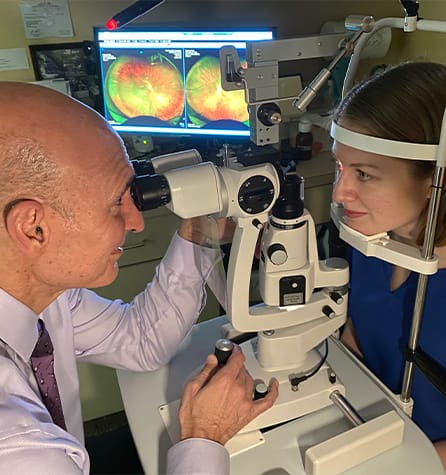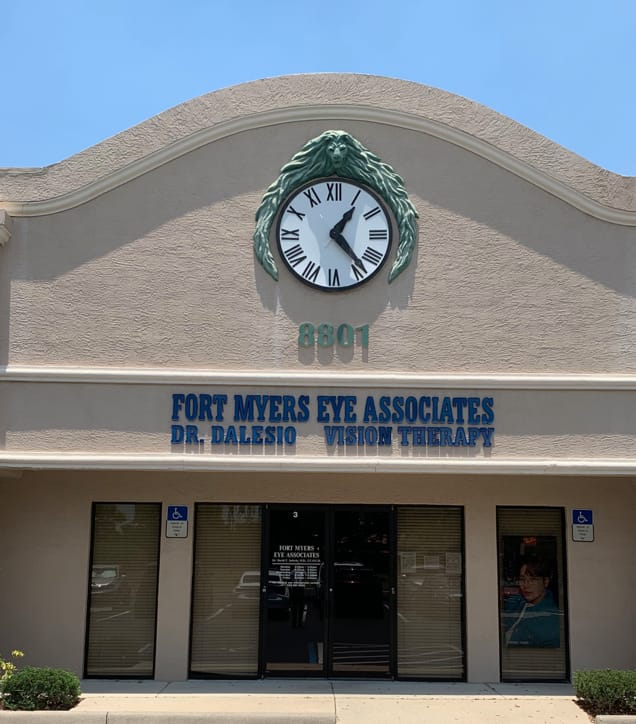Keeping an Eye on Your Visual Health
During our eye exams, we look for more than just refractive errors. Your eye health is one of our top concerns, so we also look for any signs and symptoms of eye diseases or conditions.
It is important to keep up with regular eye exams to ensure we have the best chance at diagnosing and managing eye diseases. The sooner your optometrist can diagnose anything wrong with your eyes, the sooner you can get started on treating and preventing vision issues.
For eye disease diagnosis and management in Fort Myers, visit us for your next in-depth eye exam.


Common Eye Diseases
Dry Eye
Dry eye disease is a common eye condition that can be mitigated through proper treatments.
It is caused by environmental factors like low humidity, dust, wind, smoke, and allergens. It can also be caused by dermatological conditions like rosacea.
Common symptoms include:
- Itching, burning, or red eyes
- Dry or excessively watery eyes
- Stringy mucous
- Feeling like there’s something in your eye
- Excessive blinking
Some treatment options include:
- Applying a warm compress to your eyelids twice per day
- Using high-quality eye drops and artificial tears
- Meibomian gland expression
- Using mild soaps to keep your eyelids clean
- Specific medical-quality Omega 3 Fatty Acids
Other options to treat your dry eyes may be available—speak to your optometrist to learn more.
Conjunctivitis
Also known as “pink eye,” conjunctivitis happens when the whites and inner lids of one or both eyes become inflamed. It can be caused by a bacterial or viral infection, allergies, chemicals, or an unopened tear duct (in babies).
Some forms of conjunctivitis are contagious and can be spread between people. It is important to practice good hygiene routines like handwashing, and don’t share cosmetics with others.
Common symptoms include:
- Redness or itching in one or both eyes
- Gritty sensation in one or both eyes
- Yellowy discharge in on or both eyes
- Crusty eyes in the morning
- Excessive tearing
Some treatments may include:
- Using a cool compress to alleviate discomfort
- Anti-inflammatory medications and antihistamines
- Prescription drops and ointments
Glaucoma
Glaucoma causes peripheral vision loss, and is often referred to as the “sneak thief of sight.” Glaucoma earned this nickname because many people with it don’t notice any symptoms until they have lost a significant amount of peripheral vision.
More common in people over the age of 60, glaucoma risk is increased by family history, medical conditions, physical injuries, corticosteroid use, and race—African Americans are significantly more likely to develop glaucoma.
Glaucoma has two types: open-angle glaucoma and acute angle-closure glaucoma.
Open-angle glaucoma
This type is more common and develops slowly, often without any symptoms. Initially, open-angle glaucoma affects peripheral vision, but it can eventually lead to loss of central vision.
Treatment is aimed at reducing the pressure in the eye and includes:
- Prescription eye drops
- Medications
- Laser surgery
- Inserting drainage valves via surgery
Acute angle-closure glaucoma
Usually occurring abruptly, acute angle-closure glaucoma happens due to rapidly increased pressure in the eye.
Common symptoms of acute angle-closure glaucoma include:
- A sudden blockage of drainage channels in the eye
- Rapidly increased pressure in the eye
- Blurred vision
- Halos and colored rings when looking at lights
- Pain and redness in the eye
Acute angle-closure is an emergency. People who experience this will likely undergo a peripheral iridotomy—where a laser creates a small hole in the iris to allow fluid to move freely to the front chamber in the eye.
Cataracts
Characterized by cloudy vision, cataracts affect the crystalline lens in the front of your eye. More than half of Americans over 80 have cataracts or have had surgery to remove them.
Most cataracts happen later in life. They typically occur as a result of aging, but cataracts can happen for numerous reasons—including eye injuries and glaucoma.
Your eye doctor can help you compensate for cataracts with glasses or contact lenses for a while, but cataracts will continue to gradually become worse. Surgery is the only way to restore the vision cataracts have obscured.
Symptoms of cataracts include:
- Cloudy or blurry vision
- Faded color vision
- Poor night vision
- Light sensitivity
- Halos around lights
- Seeing double
- Frequent prescription changes
Macular Degeneration
Your macula is at the back of your eye, and it is responsible for clear straight-ahead vision. The macula controls your ability to read, recognize faces, watch TV, and more.
Also called age-related macular degeneration (ARMD or AMD), macular degeneration is one of the leading causes of blindness in adults age 65 and older.
There are two kinds of AMD: dry and wet. Dry macular degeneration is less severe and deteriorates vision more slowly than wet macular degeneration. The wet form is more advanced, quicker-moving, and more severe.
Symptoms of macular degeneration are:
- Poor night vision
- Difficulty reading (lines may become distorted)
- Dark blurry vision in the center of your eyes
- Sensitivity to light and glare
There’s no stopping macular degeneration once it begins, but there are ways to slow its progression with supplements and prescriptions from your eye doctor.
There are also at-home tests you can do, like the Amsler Grid, to check in on your vision if you are at risk.
Diabetic Retinopathy
Diabetes can cause many different health complications. Prolonged high blood sugar levels can lead to vision problems.
Diabetic retinopathy can affect blood flow to the vessels attached to your retina. This can cause them to swell, leak, or close off. Abnormal blood vessels can then begin to grow, eventually causing eye damage and vision loss.
Diabetic retinopathy can lead to macular edema, which occurs when there is abnormal leakage or a buildup of fluid in your macula. Your macula can swell, causing blurry or wavy vision in the middle of your eyesight.
People with diabetes are at a higher risk of glaucoma and cataracts.

Preventing Vision Loss
Regular eye exams can detect the early onset of many eye diseases.
In the meantime, if you experience any symptoms that could be related to any type of eye disease, you should call your optometrist right away.
See Us For Yourself
Find us on College Parkway between Winkler Road and Premiere Boulevard. We’re located east of the Cape Coral bridge. We serve Fort Myers, Cape Coral, Estero, Lehigh, and surrounding areas.


OUR LOCATION
- 8801 College Parkway Suite 3
- Fort Myers, FL 33919
CONTACT US
- Phone: 239.437.2004
OUR HOURS
- Monday: 8:30am – 5:30pm
- Tuesday: 8:30am – 5:30pm
- Wednesday: 1:00pm – 8:30pm
- Thursday: 8:30am – 5:30pm
- Friday: 8:30am – 4:30pm
- Saturday: Closed
- Sunday: Closed
Our Services
Our Brands

















